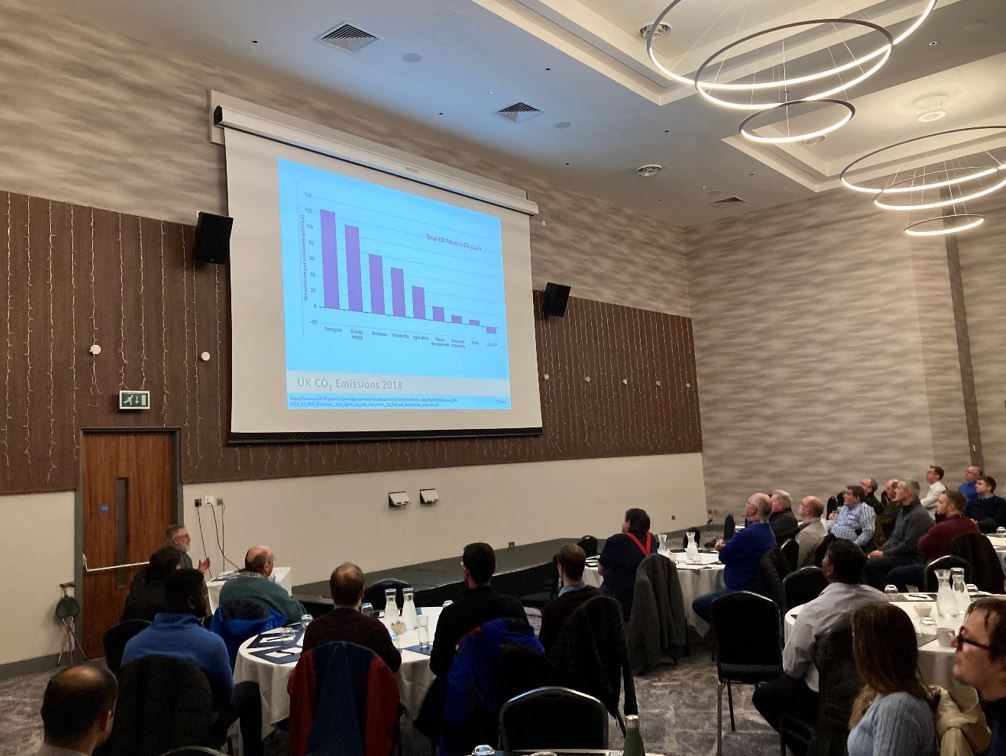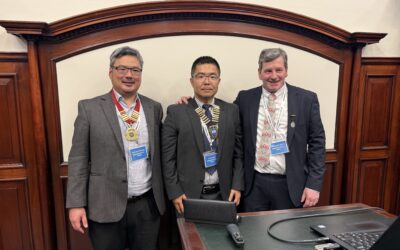ICorr join forces with IMechE for a special Pre-Christmas Celebration.
On 20th December 2023, the Aberdeen ICorr Branch were guests of IMechE for a Joint Event at the Sandman Hotel in Aberdeen. This end of year Celebration that was very well attended with around 60 guests and was chaired by Steve Cromar CEng, FIMechE, IMechE Aberdeen Chair. The evening commenced with a welcome Hot Buffet Dinner, which was an excellent choice for a cold Winter night.
Tom Baxter a Chemical Engineering Consultant and founding member of the Hydrogen Science Coalition spoke on ‘Future Energies and Greenhouse Gas Reduction’.
Tom Baxter BSc (Hons), FIChemE
Tom graduated from Strathclyde University in 1975 with a B.Sc. in Chemical Engineering (first class honours) and is a Fellow of the IChemE. He started his career with ICI Petrochemicals, moved to fine chemicals with the Swiss company Ciba-Geigy before taking a position as a Process Engineer in 1980 with BNOC (British National Oil Corporation). Through privatisation and acquisitions BNOC became Britoil, then BP. Here he worked as an Operations Engineer, Development Engineer and Research Manager. In 1991 he left BP subsequently held positions with Altra Consultants as Technical Manager, as Technical Director with Genesis in 1998 and became the Aberdeen Business Unit Director in 2005. From 2010 together with became a Senior Fellow in the Chemical Engineering Department at Aberdeen University, which he helped establish and since 2003 he has been a visiting Professor of Chemical Engineering at Strathclyde University.
This coming decade is extremely important for achieving reductions and Individual impacts are great. During his most interesting talk key themes discussed were ways to use less energy and an eye-opening debate on the misconceptions about renewable alternatives, (in terms of actual energy efficiency breakdown from production through to final distribution) which was considered in great detail. Overall electrification came out as a very safe and efficient energy source.
Industrial Hydrogen Use
Hydrogen (H2) does have some favourable characteristics – particularly buoyancy and no carbon monoxide but has low caloric value. Generally, Hydrogen compares unfavourably overall with Methane properties and has limited applications presently. For example, it requires three times the amount of compression power to move it along pipelines and much talked of blending Hydrogen was not seen as a good idea although a 20% blend has much promoted of late by others presenting to the Institute.
H2 is considered applicable for Transport (although passenger car-dominated) and for some specialised industries e.g. steel making. There have been recent question marks over some H2 driven projects. Pau (in France) cancelled its H2 buses and the Redcar hydrogen project was recently cancelled.
Full electric vehicles are seen as most energy efficient, for trains only low train passenger routes in the UK (8ookms out of 15000 kms) but there are lots of Hydrogen miscellaneous uses, but batteries are the key to the future progression of renewables. Presently the accurate Hydrogen retail cost is not clearly defined.
Tom Baxter (seated) Chemical Engineering Consultant and Hydrogen Expert presented.
Tom also spoke of https://www.h100fife.co.uk/ a parliamentary party group with interests including Cadent / Shell / others – Projected costs to 2050 however are not considered reliable.
Domestic Hydrogen Use
Vested interests e.g. Catapult and EUA have recently promoted Hydrogen for heating. Tom reviewed the outcomes of hy4heat – Hy4Heat Its mission was to establish if it was technically possible, safe and convenient to replace natural gas (methane) with hydrogen in residential and commercial buildings.
Through a QRA study, they found that Hydrogen was inherently less safe than Methane QRA with three times as many potential events. Hydrogen usage requires more safety features and is 40% less energy efficient overall. Electric energy provides greater wattage.
Summary
Generally, with renewables, more government support is needed, so as to give more headroom / opportunity to recover capital cost over a longer period.
Tom Baxter was extremely knowledgeable and provided a most interesting talk.
Refer www.h2sciencecoalition.com
Members of the Aberdeen ICorr Committee, with new member Stephanie Okoye 2nd from Left, with guest Shukun Liu (Oceaneering) far right.
Q&A
A lively Q&A followed:
- Will Hydrogen deliver in the short term? – No. Tom was of the view that the UK government was without a proper energy strategy and unfortunately its politicians are mostly not Stem educated (only about 10%) and therefore don’t ask right questions when dealing with potential energy providers.
- How do we manage the Stakeholders for H2 development? – Tom felt that key policy must come from Government but they must understand all the issues.
- How can we educate local communities properly about energy and renewables? – Tom proposed that Engineering Institutions like IMechE and ICorr are best placed to provide reliable information to the public.
Future Meetings
The Aberdeen Branch of ICorr hopes to continue its relationship with IMechE during the next Technical Session 2024-2025
IMechE Aberdeen meet on the third Wednesday of each month and may be contacted at:
Contact the Aberdeen Area – Institution of Mechanical Engineers (imeche.org)
ICorr Aberdeen meet on the last Tuesday of each month and may be contacted at:





